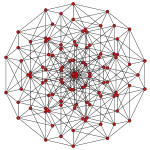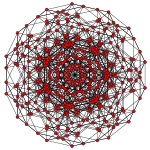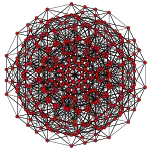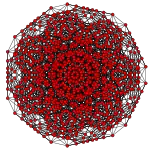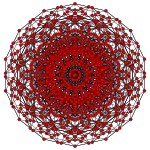 6-simplex |
 Pentellated 6-simplex |
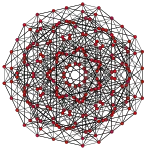 Pentitruncated 6-simplex |
 Penticantellated 6-simplex |
 Penticantitruncated 6-simplex |
 Pentiruncitruncated 6-simplex |
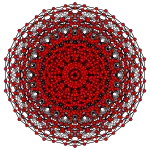 Pentiruncicantellated 6-simplex |
 Pentiruncicantitruncated 6-simplex |
 Pentisteritruncated 6-simplex |
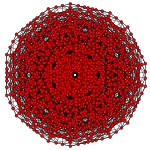 Pentistericantitruncated 6-simplex |
 Pentisteriruncicantitruncated 6-simplex (Omnitruncated 6-simplex) | |
| Orthogonal projections in A6 Coxeter plane | |||
|---|---|---|---|
In six-dimensional geometry, a pentellated 6-simplex is a convex uniform 6-polytope with 5th order truncations of the regular 6-simplex.
There are unique 10 degrees of pentellations of the 6-simplex with permutations of truncations, cantellations, runcinations, and sterications. The simple pentellated 6-simplex is also called an expanded 6-simplex, constructed by an expansion operation applied to the regular 6-simplex. The highest form, the pentisteriruncicantitruncated 6-simplex, is called an omnitruncated 6-simplex with all of the nodes ringed.
Pentellated 6-simplex
| Pentellated 6-simplex | |
|---|---|
| Type | Uniform 6-polytope |
| Schläfli symbol | t0,5{3,3,3,3,3} |
| Coxeter-Dynkin diagram | |
| 5-faces | 126: 7+7 {34} 21+21 {}×{3,3,3} 35+35 {3}×{3,3} |
| 4-faces | 434 |
| Cells | 630 |
| Faces | 490 |
| Edges | 210 |
| Vertices | 42 |
| Vertex figure | 5-cell antiprism |
| Coxeter group | A6×2, [[3,3,3,3,3]], order 10080 |
| Properties | convex |
Alternate names
- Expanded 6-simplex
- Small terated tetradecapeton (Acronym: staf) (Jonathan Bowers)[1]
Coordinates
The vertices of the pentellated 6-simplex can be positioned in 7-space as permutations of (0,1,1,1,1,1,2). This construction is based on facets of the pentellated 7-orthoplex.
A second construction in 7-space, from the center of a rectified 7-orthoplex is given by coordinate permutations of:
- (1,-1,0,0,0,0,0)
Root vectors
Its 42 vertices represent the root vectors of the simple Lie group A6. It is the vertex figure of the 6-simplex honeycomb.
Images
| Ak Coxeter plane | A6 | A5 | A4 |
|---|---|---|---|
| Graph |  |
 |
 |
| Symmetry | [[7]](*)=[14] | [6] | [[5]](*)=[10] |
| Ak Coxeter plane | A3 | A2 | |
| Graph |  |
 | |
| Symmetry | [4] | [[3]](*)=[6] |
- Note: (*) Symmetry doubled for Ak graphs with even k due to symmetrically-ringed Coxeter-Dynkin diagram.
Configuration
This configuration matrix represents the expanded 6-simplex, with 12 permutations of elements. The rows and columns correspond to vertices, edges, faces, cells, 4-faces and 5-faces. The diagonal numbers say how many of each element occur in the whole polytope. The nondiagonal numbers say how many of the column's element occur in or at the row's element.[2]
| Element | fk | f0 | f1 | f2 | f3 | f4 | f5 | ||||||
|---|---|---|---|---|---|---|---|---|---|---|---|---|---|
| f0 | 42 | 10 | 20 | 20 | 20 | 60 | 10 | 40 | 30 | 2 | 10 | 20 | |
| f1 | 2 | 210 | 4 | 4 | 6 | 18 | 4 | 16 | 12 | 1 | 5 | 10 | |
| f2 | 3 | 3 | 280 | * | 3 | 3 | 3 | 6 | 3 | 1 | 3 | 4 | |
| 4 | 4 | * | 210 | 0 | 6 | 0 | 6 | 6 | 0 | 2 | 6 | ||
| f3 | 4 | 6 | 4 | 0 | 210 | * | 2 | 2 | 0 | 1 | 2 | 1 | |
| 6 | 9 | 2 | 3 | * | 420 | 0 | 2 | 2 | 0 | 1 | 3 | ||
| f4 | 5 | 10 | 10 | 0 | 5 | 0 | 84 | * | * | 1 | 1 | 0 | |
| 8 | 16 | 8 | 6 | 2 | 4 | * | 210 | * | 0 | 1 | 1 | ||
| 9 | 18 | 6 | 9 | 0 | 6 | * | * | 140 | 0 | 0 | 2 | ||
| f5 | 6 | 15 | 20 | 0 | 15 | 0 | 6 | 0 | 0 | 14 | * | * | |
| 10 | 25 | 20 | 10 | 10 | 10 | 2 | 5 | 0 | * | 42 | * | ||
| 12 | 30 | 16 | 18 | 3 | 18 | 0 | 3 | 4 | * | * | 70 | ||
Pentitruncated 6-simplex
| Pentitruncated 6-simplex | |
|---|---|
| Type | uniform 6-polytope |
| Schläfli symbol | t0,1,5{3,3,3,3,3} |
| Coxeter-Dynkin diagrams | |
| 5-faces | 126 |
| 4-faces | 826 |
| Cells | 1785 |
| Faces | 1820 |
| Edges | 945 |
| Vertices | 210 |
| Vertex figure | |
| Coxeter group | A6, [3,3,3,3,3], order 5040 |
| Properties | convex |
Alternate names
- Teracellated heptapeton (Acronym: tocal) (Jonathan Bowers)[3]
Coordinates
The vertices of the runcitruncated 6-simplex can be most simply positioned in 7-space as permutations of (0,1,1,1,1,2,3). This construction is based on facets of the runcitruncated 7-orthoplex.
Images
| Ak Coxeter plane | A6 | A5 | A4 |
|---|---|---|---|
| Graph |  |
 |
 |
| Dihedral symmetry | [7] | [6] | [5] |
| Ak Coxeter plane | A3 | A2 | |
| Graph |  |
 | |
| Dihedral symmetry | [4] | [3] |
Penticantellated 6-simplex
| Penticantellated 6-simplex | |
|---|---|
| Type | uniform 6-polytope |
| Schläfli symbol | t0,2,5{3,3,3,3,3} |
| Coxeter-Dynkin diagrams | |
| 5-faces | 126 |
| 4-faces | 1246 |
| Cells | 3570 |
| Faces | 4340 |
| Edges | 2310 |
| Vertices | 420 |
| Vertex figure | |
| Coxeter group | A6, [3,3,3,3,3], order 5040 |
| Properties | convex |
Alternate names
- Teriprismated heptapeton (Acronym: topal) (Jonathan Bowers)[4]
Coordinates
The vertices of the runcicantellated 6-simplex can be most simply positioned in 7-space as permutations of (0,1,1,1,1,2,3). This construction is based on facets of the penticantellated 7-orthoplex.
Images
| Ak Coxeter plane | A6 | A5 | A4 |
|---|---|---|---|
| Graph |  |
 |
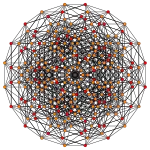 |
| Dihedral symmetry | [7] | [6] | [5] |
| Ak Coxeter plane | A3 | A2 | |
| Graph |  |
 | |
| Dihedral symmetry | [4] | [3] |
Penticantitruncated 6-simplex
| penticantitruncated 6-simplex | |
|---|---|
| Type | uniform 6-polytope |
| Schläfli symbol | t0,1,2,5{3,3,3,3,3} |
| Coxeter-Dynkin diagrams | |
| 5-faces | 126 |
| 4-faces | 1351 |
| Cells | 4095 |
| Faces | 5390 |
| Edges | 3360 |
| Vertices | 840 |
| Vertex figure | |
| Coxeter group | A6, [3,3,3,3,3], order 5040 |
| Properties | convex |
Alternate names
- Terigreatorhombated heptapeton (Acronym: togral) (Jonathan Bowers)[5]
Coordinates
The vertices of the penticantitruncated 6-simplex can be most simply positioned in 7-space as permutations of (0,1,1,1,2,3,4). This construction is based on facets of the penticantitruncated 7-orthoplex.
Images
| Ak Coxeter plane | A6 | A5 | A4 |
|---|---|---|---|
| Graph |  |
 |
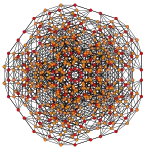 |
| Dihedral symmetry | [7] | [6] | [5] |
| Ak Coxeter plane | A3 | A2 | |
| Graph |  |
 | |
| Dihedral symmetry | [4] | [3] |
Pentiruncitruncated 6-simplex
| pentiruncitruncated 6-simplex | |
|---|---|
| Type | uniform 6-polytope |
| Schläfli symbol | t0,1,3,5{3,3,3,3,3} |
| Coxeter-Dynkin diagrams | |
| 5-faces | 126 |
| 4-faces | 1491 |
| Cells | 5565 |
| Faces | 8610 |
| Edges | 5670 |
| Vertices | 1260 |
| Vertex figure | |
| Coxeter group | A6, [3,3,3,3,3], order 5040 |
| Properties | convex |
Alternate names
- Tericellirhombated heptapeton (Acronym: tocral) (Jonathan Bowers)[6]
Coordinates
The vertices of the pentiruncitruncated 6-simplex can be most simply positioned in 7-space as permutations of (0,1,1,1,2,3,4). This construction is based on facets of the pentiruncitruncated 7-orthoplex.
Images
| Ak Coxeter plane | A6 | A5 | A4 |
|---|---|---|---|
| Graph |  |
 |
 |
| Dihedral symmetry | [7] | [6] | [5] |
| Ak Coxeter plane | A3 | A2 | |
| Graph |  |
 | |
| Dihedral symmetry | [4] | [3] |
Pentiruncicantellated 6-simplex
| Pentiruncicantellated 6-simplex | |
|---|---|
| Type | uniform 6-polytope |
| Schläfli symbol | t0,2,3,5{3,3,3,3,3} |
| Coxeter-Dynkin diagrams | |
| 5-faces | 126 |
| 4-faces | 1596 |
| Cells | 5250 |
| Faces | 7560 |
| Edges | 5040 |
| Vertices | 1260 |
| Vertex figure | |
| Coxeter group | A6, [[3,3,3,3,3]], order 10080 |
| Properties | convex |
Alternate names
- Teriprismatorhombated tetradecapeton (Acronym: taporf) (Jonathan Bowers)[7]
Coordinates
The vertices of the pentiruncicantellated 6-simplex can be most simply positioned in 7-space as permutations of (0,1,1,2,3,3,4). This construction is based on facets of the pentiruncicantellated 7-orthoplex.
Images
| Ak Coxeter plane | A6 | A5 | A4 |
|---|---|---|---|
| Graph |  |
 |
 |
| Symmetry | [[7]](*)=[14] | [6] | [[5]](*)=[10] |
| Ak Coxeter plane | A3 | A2 | |
| Graph |  |
 | |
| Symmetry | [4] | [[3]](*)=[6] |
- Note: (*) Symmetry doubled for Ak graphs with even k due to symmetrically-ringed Coxeter-Dynkin diagram.
Pentiruncicantitruncated 6-simplex
| Pentiruncicantitruncated 6-simplex | |
|---|---|
| Type | uniform 6-polytope |
| Schläfli symbol | t0,1,2,3,5{3,3,3,3,3} |
| Coxeter-Dynkin diagrams | |
| 5-faces | 126 |
| 4-faces | 1701 |
| Cells | 6825 |
| Faces | 11550 |
| Edges | 8820 |
| Vertices | 2520 |
| Vertex figure | |
| Coxeter group | A6, [3,3,3,3,3], order 5040 |
| Properties | convex |
Alternate names
- Terigreatoprismated heptapeton (Acronym: tagopal) (Jonathan Bowers)[8]
Coordinates
The vertices of the pentiruncicantitruncated 6-simplex can be most simply positioned in 7-space as permutations of (0,1,1,2,3,4,5). This construction is based on facets of the pentiruncicantitruncated 7-orthoplex.
Images
| Ak Coxeter plane | A6 | A5 | A4 |
|---|---|---|---|
| Graph |  |
 |
 |
| Dihedral symmetry | [7] | [6] | [5] |
| Ak Coxeter plane | A3 | A2 | |
| Graph | 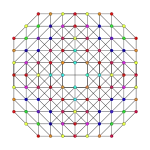 |
 | |
| Dihedral symmetry | [4] | [3] |
Pentisteritruncated 6-simplex
| Pentisteritruncated 6-simplex | |
|---|---|
| Type | uniform 6-polytope |
| Schläfli symbol | t0,1,4,5{3,3,3,3,3} |
| Coxeter-Dynkin diagrams | |
| 5-faces | 126 |
| 4-faces | 1176 |
| Cells | 3780 |
| Faces | 5250 |
| Edges | 3360 |
| Vertices | 840 |
| Vertex figure | |
| Coxeter group | A6, [[3,3,3,3,3]], order 10080 |
| Properties | convex |
Alternate names
- Tericellitruncated tetradecapeton (Acronym: tactaf) (Jonathan Bowers)[9]
Coordinates
The vertices of the pentisteritruncated 6-simplex can be most simply positioned in 7-space as permutations of (0,1,2,2,2,3,4). This construction is based on facets of the pentisteritruncated 7-orthoplex.
Images
| Ak Coxeter plane | A6 | A5 | A4 |
|---|---|---|---|
| Graph |  |
 |
 |
| Symmetry | [[7]](*)=[14] | [6] | [[5]](*)=[10] |
| Ak Coxeter plane | A3 | A2 | |
| Graph |  |
 | |
| Symmetry | [4] | [[3]](*)=[6] |
- Note: (*) Symmetry doubled for Ak graphs with even k due to symmetrically-ringed Coxeter-Dynkin diagram.
Pentistericantitruncated 6-simplex
| pentistericantitruncated 6-simplex | |
|---|---|
| Type | uniform 6-polytope |
| Schläfli symbol | t0,1,2,4,5{3,3,3,3,3} |
| Coxeter-Dynkin diagrams | |
| 5-faces | 126 |
| 4-faces | 1596 |
| Cells | 6510 |
| Faces | 11340 |
| Edges | 8820 |
| Vertices | 2520 |
| Vertex figure | |
| Coxeter group | A6, [3,3,3,3,3], order 5040 |
| Properties | convex |
Alternate names
- Great teracellirhombated heptapeton (Acronym: gatocral) (Jonathan Bowers)[10]
Coordinates
The vertices of the pentistericantittruncated 6-simplex can be most simply positioned in 7-space as permutations of (0,1,2,2,3,4,5). This construction is based on facets of the pentistericantitruncated 7-orthoplex.
Images
| Ak Coxeter plane | A6 | A5 | A4 |
|---|---|---|---|
| Graph |  |
 |
 |
| Dihedral symmetry | [7] | [6] | [5] |
| Ak Coxeter plane | A3 | A2 | |
| Graph |  |
 | |
| Dihedral symmetry | [4] | [3] |
Omnitruncated 6-simplex
| Omnitruncated 6-simplex | |
|---|---|
| Type | Uniform 6-polytope |
| Schläfli symbol | t0,1,2,3,4,5{35} |
| Coxeter-Dynkin diagrams | |
| 5-faces | 126: 14 t0,1,2,3,4{34} 42 {}×t0,1,2,3{33} 70 {6}×t0,1,2{3,3} |
| 4-faces | 1806 |
| Cells | 8400 |
| Faces | 16800: 4200 {6} 1260 {4} |
| Edges | 15120 |
| Vertices | 5040 |
| Vertex figure |  irregular 5-simplex |
| Coxeter group | A6, [[35]], order 10080 |
| Properties | convex, isogonal, zonotope |
The omnitruncated 6-simplex has 5040 vertices, 15120 edges, 16800 faces (4200 hexagons and 1260 squares), 8400 cells, 1806 4-faces, and 126 5-faces. With 5040 vertices, it is the largest of 35 uniform 6-polytopes generated from the regular 6-simplex.
Alternate names
- Pentisteriruncicantitruncated 6-simplex (Johnson's omnitruncation for 6-polytopes)
- Omnitruncated heptapeton
- Great terated tetradecapeton (Acronym: gotaf) (Jonathan Bowers)[11]
Permutohedron and related tessellation
The omnitruncated 6-simplex is the permutohedron of order 7. The omnitruncated 6-simplex is a zonotope, the Minkowski sum of seven line segments parallel to the seven lines through the origin and the seven vertices of the 6-simplex.
Like all uniform omnitruncated n-simplices, the omnitruncated 6-simplex can tessellate space by itself, in this case 6-dimensional space with three facets around each hypercell. It has Coxeter-Dynkin diagram of ![]()
![]()
![]()
![]()
![]()
![]()
![]() .
.
Coordinates
The vertices of the omnitruncated 6-simplex can be most simply positioned in 7-space as permutations of (0,1,2,3,4,5,6). This construction is based on facets of the pentisteriruncicantitruncated 7-orthoplex, t0,1,2,3,4,5{35,4}, ![]()
![]()
![]()
![]()
![]()
![]()
![]()
![]()
![]()
![]()
![]()
![]()
![]() .
.
Images
| Ak Coxeter plane | A6 | A5 | A4 |
|---|---|---|---|
| Graph |  |
 |
 |
| Symmetry | [[7]](*)=[14] | [6] | [[5]](*)=[10] |
| Ak Coxeter plane | A3 | A2 | |
| Graph | 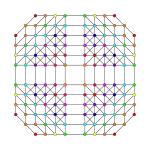 |
 | |
| Symmetry | [4] | [[3]](*)=[6] |
- Note: (*) Symmetry doubled for Ak graphs with even k due to symmetrically-ringed Coxeter-Dynkin diagram.
Configuration
This configuration matrix represents the omnitruncated 6-simplex, with 35 permutations of elements. The rows and columns correspond to vertices, edges, faces, cells, 4-faces and 5-faces. The diagonal numbers say how many of each element occur in the whole polytope. The nondiagonal numbers say how many of the column's element occur in or at the row's element.[12]
| Element | fk | f0 | f1 | f2 | f3 | f4 | f5 | |||||||||||||||||||||||||||||
|---|---|---|---|---|---|---|---|---|---|---|---|---|---|---|---|---|---|---|---|---|---|---|---|---|---|---|---|---|---|---|---|---|---|---|---|---|
| f0 | 5040 | 2 | 2 | 2 | 2 | 2 | 2 | 2 | 1 | 2 | 2 | 1 | 1 | 2 | 2 | 2 | 2 | 2 | 2 | 2 | 2 | 2 | 2 | 2 | 2 | 2 | 2 | 2 | 1 | 2 | 1 | 1 | 2 | 2 | 2 | |
| f1 | 2 | 5040 | * | * | 1 | 1 | 1 | 1 | 1 | 0 | 0 | 0 | 0 | 1 | 1 | 1 | 2 | 1 | 1 | 2 | 1 | 0 | 0 | 1 | 1 | 2 | 1 | 2 | 1 | 1 | 1 | 0 | 1 | 2 | 2 | |
| 2 | * | 5040 | * | 1 | 0 | 0 | 1 | 0 | 1 | 1 | 1 | 0 | 1 | 1 | 2 | 1 | 0 | 1 | 0 | 1 | 1 | 2 | 1 | 2 | 1 | 2 | 1 | 1 | 1 | 0 | 1 | 2 | 1 | 2 | ||
| 2 | * | * | 5040 | 0 | 1 | 1 | 0 | 0 | 1 | 1 | 0 | 1 | 1 | 1 | 0 | 0 | 2 | 1 | 1 | 1 | 2 | 1 | 2 | 1 | 1 | 1 | 1 | 0 | 2 | 1 | 1 | 2 | 2 | 1 | ||
| f2 | 6 | 3 | 3 | 0 | 1680 | * | * | * | * | * | * | * | * | 1 | 1 | 1 | 1 | 0 | 0 | 0 | 0 | 0 | 0 | 1 | 1 | 1 | 1 | 1 | 1 | 0 | 0 | 0 | 1 | 1 | 2 | |
| 4 | 2 | 0 | 2 | * | 2520 | * | * | * | * | * | * | * | 1 | 0 | 0 | 0 | 1 | 1 | 1 | 0 | 0 | 0 | 1 | 1 | 1 | 0 | 1 | 0 | 1 | 1 | 0 | 1 | 2 | 1 | ||
| 4 | 2 | 0 | 2 | * | * | 2520 | * | * | * | * | * | * | 0 | 1 | 0 | 0 | 1 | 0 | 1 | 1 | 0 | 0 | 1 | 0 | 1 | 1 | 1 | 0 | 1 | 1 | 0 | 1 | 2 | 1 | ||
| 4 | 2 | 2 | 0 | * | * | * | 2520 | * | * | * | * | * | 0 | 0 | 1 | 1 | 0 | 1 | 0 | 1 | 0 | 0 | 0 | 1 | 1 | 1 | 1 | 1 | 1 | 0 | 0 | 1 | 1 | 2 | ||
| 4 | 4 | 0 | 0 | * | * | * | * | 1260 | * | * | * | * | 0 | 0 | 0 | 2 | 0 | 0 | 2 | 0 | 0 | 0 | 0 | 0 | 2 | 0 | 2 | 1 | 0 | 1 | 0 | 0 | 2 | 2 | ||
| 6 | 0 | 3 | 3 | * | * | * | * | * | 1680 | * | * | * | 1 | 0 | 0 | 0 | 0 | 0 | 0 | 1 | 1 | 1 | 1 | 1 | 1 | 1 | 0 | 0 | 1 | 0 | 1 | 2 | 1 | 1 | ||
| 4 | 0 | 2 | 2 | * | * | * | * | * | * | 2520 | * | * | 0 | 1 | 0 | 0 | 0 | 1 | 0 | 0 | 1 | 1 | 1 | 1 | 0 | 1 | 1 | 0 | 1 | 0 | 1 | 2 | 1 | 1 | ||
| 4 | 0 | 4 | 0 | * | * | * | * | * | * | * | 1260 | * | 0 | 0 | 2 | 0 | 0 | 0 | 0 | 0 | 0 | 2 | 0 | 2 | 0 | 2 | 0 | 1 | 0 | 0 | 1 | 2 | 0 | 2 | ||
| 6 | 0 | 0 | 6 | * | * | * | * | * | * | * | * | 840 | 0 | 0 | 0 | 0 | 2 | 0 | 0 | 0 | 2 | 0 | 2 | 0 | 0 | 0 | 0 | 0 | 2 | 1 | 1 | 2 | 2 | 0 | ||
| f3 | 24 | 12 | 12 | 12 | 4 | 6 | 0 | 0 | 0 | 4 | 0 | 0 | 0 | 420 | * | * | * | * | * | * | * | * | * | 1 | 1 | 1 | 0 | 0 | 0 | 0 | 0 | 0 | 1 | 1 | 1 | |
| 12 | 6 | 6 | 6 | 2 | 0 | 3 | 0 | 0 | 0 | 3 | 0 | 0 | * | 840 | * | * | * | * | * | * | * | * | 1 | 0 | 0 | 1 | 1 | 0 | 0 | 0 | 0 | 1 | 1 | 1 | ||
| 12 | 6 | 12 | 0 | 2 | 0 | 0 | 3 | 0 | 0 | 0 | 3 | 0 | * | * | 840 | * | * | * | * | * | * | * | 0 | 1 | 0 | 1 | 0 | 1 | 0 | 0 | 0 | 1 | 0 | 2 | ||
| 12 | 12 | 6 | 0 | 2 | 0 | 0 | 3 | 3 | 0 | 0 | 0 | 0 | * | * | * | 840 | * | * | * | * | * | * | 0 | 0 | 1 | 0 | 1 | 1 | 0 | 0 | 0 | 0 | 1 | 2 | ||
| 12 | 6 | 0 | 12 | 0 | 3 | 3 | 0 | 0 | 0 | 0 | 0 | 2 | * | * | * | * | 840 | * | * | * | * | * | 1 | 0 | 0 | 0 | 0 | 0 | 1 | 1 | 0 | 1 | 2 | 0 | ||
| 8 | 4 | 4 | 4 | 0 | 2 | 0 | 2 | 0 | 0 | 2 | 0 | 0 | * | * | * | * | * | 1260 | * | * | * | * | 0 | 1 | 0 | 0 | 1 | 0 | 1 | 0 | 0 | 1 | 1 | 1 | ||
| 8 | 8 | 0 | 4 | 0 | 2 | 2 | 0 | 2 | 0 | 0 | 0 | 0 | * | * | * | * | * | * | 1260 | * | * | * | 0 | 0 | 1 | 0 | 1 | 0 | 0 | 1 | 0 | 0 | 2 | 1 | ||
| 12 | 6 | 6 | 6 | 0 | 0 | 3 | 3 | 0 | 2 | 0 | 0 | 0 | * | * | * | * | * | * | * | 840 | * | * | 0 | 0 | 1 | 1 | 0 | 0 | 1 | 0 | 0 | 1 | 1 | 1 | ||
| 24 | 0 | 12 | 24 | 0 | 0 | 0 | 0 | 0 | 4 | 6 | 0 | 4 | * | * | * | * | * | * | * | * | 420 | * | 1 | 0 | 0 | 0 | 0 | 0 | 1 | 0 | 1 | 2 | 1 | 0 | ||
| 12 | 0 | 12 | 6 | 0 | 0 | 0 | 0 | 0 | 2 | 3 | 3 | 0 | * | * | * | * | * | * | * | * | * | 840 | 0 | 1 | 0 | 1 | 0 | 0 | 0 | 0 | 1 | 2 | 0 | 1 | ||
| f4 | 120 | 60 | 60 | 120 | 20 | 30 | 30 | 0 | 0 | 20 | 30 | 0 | 20 | 5 | 10 | 0 | 0 | 10 | 0 | 0 | 0 | 5 | 0 | 84 | * | * | * | * | * | * | * | * | 1 | 1 | 0 | |
| 48 | 24 | 48 | 24 | 8 | 12 | 0 | 12 | 0 | 8 | 12 | 12 | 0 | 2 | 0 | 4 | 0 | 0 | 6 | 0 | 0 | 0 | 4 | * | 210 | * | * | * | * | * | * | * | 1 | 0 | 1 | ||
| 48 | 48 | 24 | 24 | 8 | 12 | 12 | 12 | 12 | 8 | 0 | 0 | 0 | 2 | 0 | 0 | 4 | 0 | 0 | 6 | 4 | 0 | 0 | * | * | 210 | * | * | * | * | * | * | 0 | 1 | 1 | ||
| 36 | 18 | 36 | 18 | 6 | 0 | 9 | 9 | 0 | 6 | 9 | 9 | 0 | 0 | 3 | 3 | 0 | 0 | 0 | 0 | 3 | 0 | 3 | * | * | * | 280 | * | * | * | * | * | 1 | 0 | 1 | ||
| 24 | 24 | 12 | 12 | 4 | 6 | 6 | 6 | 6 | 0 | 6 | 0 | 0 | 0 | 2 | 0 | 2 | 0 | 3 | 3 | 0 | 0 | 0 | * | * | * | * | 420 | * | * | * | * | 0 | 1 | 1 | ||
| 36 | 36 | 36 | 0 | 12 | 0 | 0 | 18 | 9 | 0 | 0 | 9 | 0 | 0 | 0 | 6 | 6 | 0 | 0 | 0 | 0 | 0 | 0 | * | * | * | * | * | 140 | * | * | * | 0 | 0 | 2 | ||
| 48 | 24 | 24 | 48 | 0 | 12 | 12 | 12 | 0 | 8 | 12 | 0 | 8 | 0 | 0 | 0 | 0 | 4 | 6 | 0 | 4 | 2 | 0 | * | * | * | * | * | * | 210 | * | * | 1 | 1 | 0 | ||
| 24 | 24 | 0 | 24 | 0 | 12 | 12 | 0 | 6 | 0 | 0 | 0 | 4 | 0 | 0 | 0 | 0 | 4 | 0 | 6 | 0 | 0 | 0 | * | * | * | * | * | * | * | 210 | * | 0 | 2 | 0 | ||
| 120 | 0 | 120 | 120 | 0 | 0 | 0 | 0 | 0 | 40 | 60 | 30 | 20 | 0 | 0 | 0 | 0 | 0 | 0 | 0 | 0 | 10 | 20 | * | * | * | * | * | * | * | * | 42 | 2 | 0 | 0 | ||
| f5 | 720 | 360 | 720 | 720 | 120 | 180 | 180 | 180 | 0 | 240 | 360 | 180 | 120 | 30 | 60 | 60 | 0 | 60 | 90 | 0 | 60 | 60 | 120 | 6 | 15 | 0 | 20 | 0 | 0 | 15 | 0 | 6 | 14 | * | * | |
| 240 | 240 | 120 | 240 | 40 | 120 | 120 | 60 | 60 | 40 | 60 | 0 | 40 | 10 | 20 | 0 | 20 | 40 | 30 | 60 | 20 | 10 | 0 | 2 | 0 | 5 | 0 | 10 | 0 | 5 | 10 | 0 | * | 42 | * | ||
| 144 | 144 | 144 | 72 | 48 | 36 | 36 | 72 | 36 | 24 | 36 | 36 | 0 | 6 | 12 | 24 | 24 | 0 | 18 | 18 | 12 | 0 | 12 | 0 | 3 | 3 | 4 | 6 | 4 | 0 | 0 | 0 | * | * | 70 | ||
Full snub 6-simplex
The full snub 6-simplex or omnisnub 6-simplex, defined as an alternation of the omnitruncated 6-simplex is not uniform, but it can be given Coxeter diagram ![]()
![]()
![]()
![]()
![]()
![]()
![]()
![]()
![]()
![]()
![]() and symmetry [[3,3,3,3,3]]+, and constructed from 14 snub 5-simplexes, 42 snub 5-cell antiprisms, 70 3-s{3,4} duoantiprisms, and 2520 irregular 5-simplexes filling the gaps at the deleted vertices.
and symmetry [[3,3,3,3,3]]+, and constructed from 14 snub 5-simplexes, 42 snub 5-cell antiprisms, 70 3-s{3,4} duoantiprisms, and 2520 irregular 5-simplexes filling the gaps at the deleted vertices.
Related uniform 6-polytopes
The pentellated 6-simplex is one of 35 uniform 6-polytopes based on the [3,3,3,3,3] Coxeter group, all shown here in A6 Coxeter plane orthographic projections.
Notes
- ↑ Klitzing, (x3o3o3o3o3x - staf)
- ↑ https://bendwavy.org/klitzing/incmats/staf.htm
- ↑ Klitzing, (x3x3o3o3o3x - tocal)
- ↑ Klitzing, (x3o3x3o3o3x - topal)
- ↑ Klitzing, (x3x3x3o3o3x - togral)
- ↑ Klitzing, (x3x3o3x3o3x - tocral)
- ↑ Klitzing, (x3o3x3x3o3x - taporf)
- ↑ Klitzing, (x3x3x3o3x3x - tagopal)
- ↑ Klitzing, (x3x3o3o3x3x - tactaf)
- ↑ Klitzing, (x3x3x3o3x3x - gatocral)
- ↑ Klitzing, (x3x3x3x3x3x - gotaf)
- ↑ https://bendwavy.org/klitzing/incmats/gotaf.htm
References
- H.S.M. Coxeter:
- H.S.M. Coxeter, Regular Polytopes, 3rd Edition, Dover New York, 1973
- Kaleidoscopes: Selected Writings of H.S.M. Coxeter, edited by F. Arthur Sherk, Peter McMullen, Anthony C. Thompson, Asia Ivic Weiss, Wiley-Interscience Publication, 1995, ISBN 978-0-471-01003-6
- (Paper 22) H.S.M. Coxeter, Regular and Semi Regular Polytopes I, [Math. Zeit. 46 (1940) 380-407, MR 2,10]
- (Paper 23) H.S.M. Coxeter, Regular and Semi-Regular Polytopes II, [Math. Zeit. 188 (1985) 559-591]
- (Paper 24) H.S.M. Coxeter, Regular and Semi-Regular Polytopes III, [Math. Zeit. 200 (1988) 3-45]
- Norman Johnson Uniform Polytopes, Manuscript (1991)
- N.W. Johnson: The Theory of Uniform Polytopes and Honeycombs, Ph.D.
- Klitzing, Richard. "6D uniform polytopes (polypeta)". x3o3o3o3o3x - staf, x3x3o3o3o3x - tocal, x3o3x3o3o3x - topal, x3x3x3o3o3x - togral, x3x3o3x3o3x - tocral, x3x3x3x3o3x - tagopal, x3x3o3o3x3x - tactaf, x3x3x3o3x3x - tacogral, x3x3x3x3x3x - gotaf
External links
- Glossary for hyperspace, George Olshevsky.
- Polytopes of Various Dimensions
- Multi-dimensional Glossary




